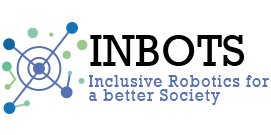
Prof. María Amparo Grau Ruiz, the principal investigator at INBOTS from the University Complutense, in collaboration with Eduard Foch-Villaronga, Postdoctoral Researcher at the eLaw Center for Law and Digital Technologies at Leiden University, and Laura Aymerich-Franch, researcher at Pompeu Fabra University, have cordinated a workshop on self-coaching tools for conducting responsible research and innovation (RRI) with social robots in the context of the Eleventh International Conference on Social Robotics (ICSR2019).
At the Workshop the following topics were discussed:
Álvaro Falcón Pulido, PhD Candidate at Universidad Complutense de Madrid on Tax and Robots, talked about Tax incentives as a way to promote Responsible Research and Innovation (RRI) in robotics. He explained that tax incentives are often used for extra-fiscal purposes, and can be used to promote responsible research and innovation in robotics. His article explores the possibility of conditioning tax incentives to research and development to an obligation to carry it out with an approach that anticipates and assesses its potential implications and societal expectations. These fiscal tools can be transitory measures that help to correct the technological gap of workers by improving their training, making them participate in some of the profits of the robots and also protect their existing jobs.
Then Helena Ancos Franco, Ansari Innovación Social, presented Towards a governance of Artificial Intelligence and Robotics. In her presentation she talked about the future of our society which depends on finding the right balance between technological development and human rights protection. The international framework for protecting human rights could be applied against discriminatory impacts caused by robotics and AI. States should take targeted measures to ensure that discrimination in the exercise of rights is eliminated, and regularly assess whether the measures chosen are effective in practice.
The assumption that the design, deploying machine learning systems, development and use of responsible technology is a shared responsibility by the States and private actors has led to the setting of Codes of Ethics and standards under the auspices of several organizations, such as the Toronto Declaration. However, the more effective way for promoting a solid protection for future robotics and AI concerns, relies at a firm level, and specially, through the design of a compliance system in line with other existing compliance systems in corporate governance and according to the principles and values of Corporate Social Responsibility.

At this workshop, Juliana Chaves-Chaparro, environmental scientist working as consultant on STI policies and Responsible Research and Innovation in UNESCO, presented Lessons from the RRING Project. She explained that at the European level, the Responsible Research and Innovation approach tries to foster social engagement, ethics, open access, science education, and gender equality through better governance of Science, Technology, and Innovation (STI). The RRING project tries to monitor RRI advancements in all regions adding to these pillars cultural and contextual aspects to link up RRI to the global world. It also aims at building a knowledge database supporting RRI competitive advantage in the 4 targeted sectors (including ICTs) and efficiency towards SDGs attainment (WP 6 lead by UNESCO).
However, the translation from policy to practice, grounding RRI approach in research institutions is not a simple task as it requires transforming mindsets of researchers and innovators. The GRRIP project will self-assess institutions, co-develop and implement RRI Action Plans in 5 Marine and Maritime RPOs (including PLOCAN in Spain) to promote mutual learning on institutional and cultural change. The lessons and experiences from these two European projects can serve to showcase advantages, limitations, and challenges of the RRI approach in other high public interest attractive sectors as robotics.
